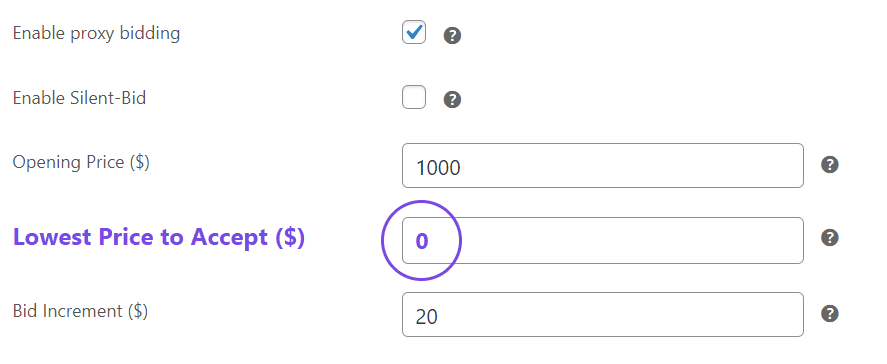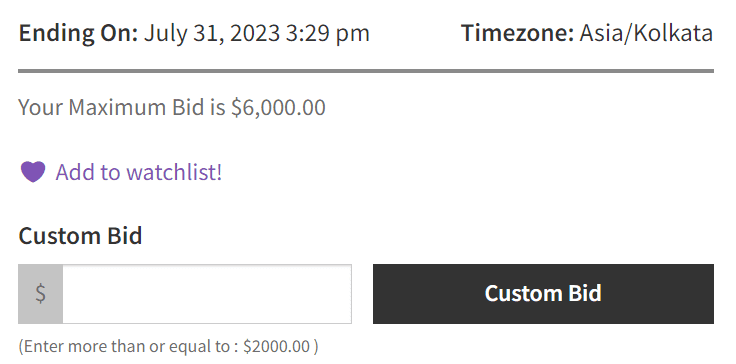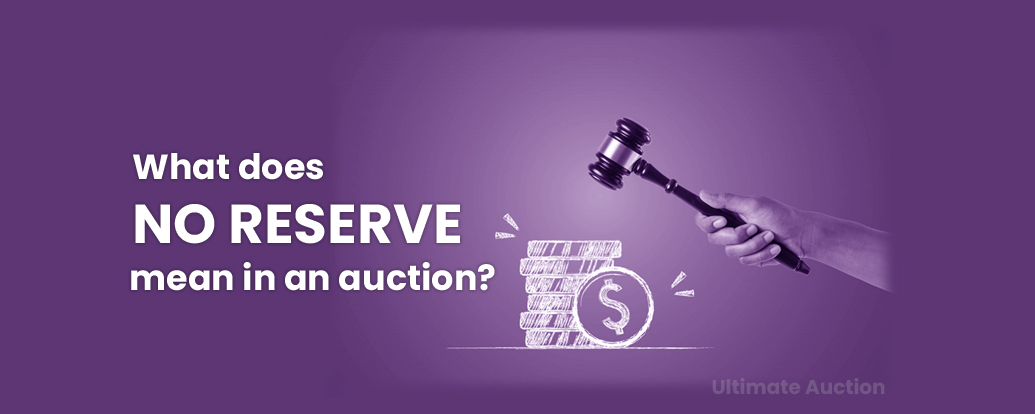



“No Reserve Auction” refers to the absence of a minimum price or a predetermined floor price for the item being auctioned. When an item is listed with “no reserve,” it means that there is no minimum price that must be met for the item to be sold.
From the seller’s perspective, listing an item without any reserve can be a bit riskier, as there’s a possibility that the final bid might not meet their desired price. However, it can also attract more bidders and increase the likelihood of competitive bidding, resulting in a potentially higher selling price.
The concept of reserves in an auction refers to a minimum price or price floor set by the seller or the auctioneer for the item being auctioned. The reserve price is the lowest amount that the seller is willing to accept as the final bid for the item. It serves as a safety net to ensure that the item is not sold for an amount lower than the seller’s desired price.

In the context of an auction, reserve money refers to the minimum price or the minimum amount that the seller is willing to accept for the item being auctioned. It is also known as the “reserve price” or “reserve bid.” The reserve money is not disclosed to the bidders; it remains confidential, and the auctioneer or the platform conducting the auction is responsible for ensuring that the reserve price is met during the bidding process.
The purpose of having reserve money in an auction is to protect the seller from selling an item for a price lower than they are willing to accept. If the bidding does not reach the reserve money during the auction, the seller is not obligated to sell the item to the highest bidder. In such a case, the auction may end without a winner, and the item may be retained by the seller.
On the other hand, if the bidding exceeds the reserve money and reaches or surpasses the set amount, the highest bidder is considered the winner, and the seller is obligated to sell the item to them at the final price. Potential bidders need to be aware of the existence of reserve money, as it can influence their decision to participate in the auction or not.
The calculation of the reserve in an auction can vary depending on the specific circumstances and the preferences of the seller. Generally, the reserve is determined by considering several factors, including the item’s value, market conditions, the seller’s expectations, and the desired level of protection for the seller.
Here are some common methods used to calculate the reserve in different types of auctions:

If your bid does not meet the reserve price in an auction, several outcomes are possible, depending on the auction rules and the seller’s preferences:
Item Not Sold: If the bidding does not reach the reserve price, the item may not be sold at that particular auction. The seller is not obligated to sell the item to the highest bidder if the reserve is not met. In this case, the auction may end without a winner for that item.
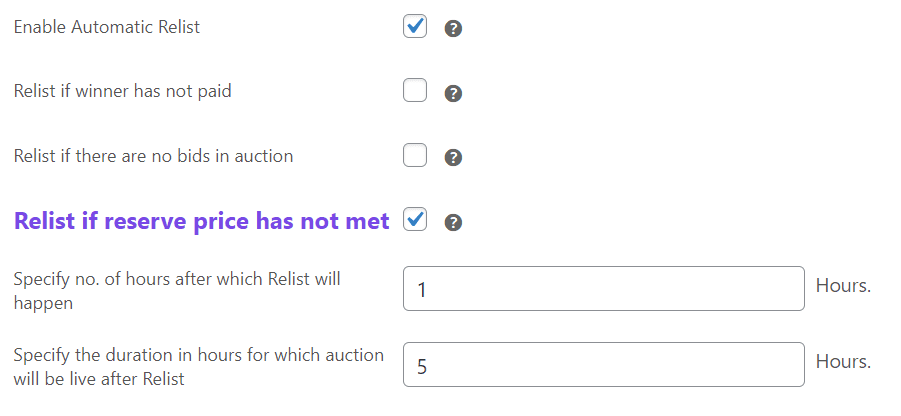
Relist the Item: In some cases, the seller may choose to relist the item in a future auction with a revised reserve price or without it at all. This gives the seller another opportunity to try and sell the item at a different time or under different market conditions.
We have given the option for auto-relist auction in our auction script.
If the admin wants to auto-relist the auction product when the reserve price has not been matched, the admin needs to enable the auto-relist option while creating the auction product.
You can see the auto-relist option in the screenshot below.
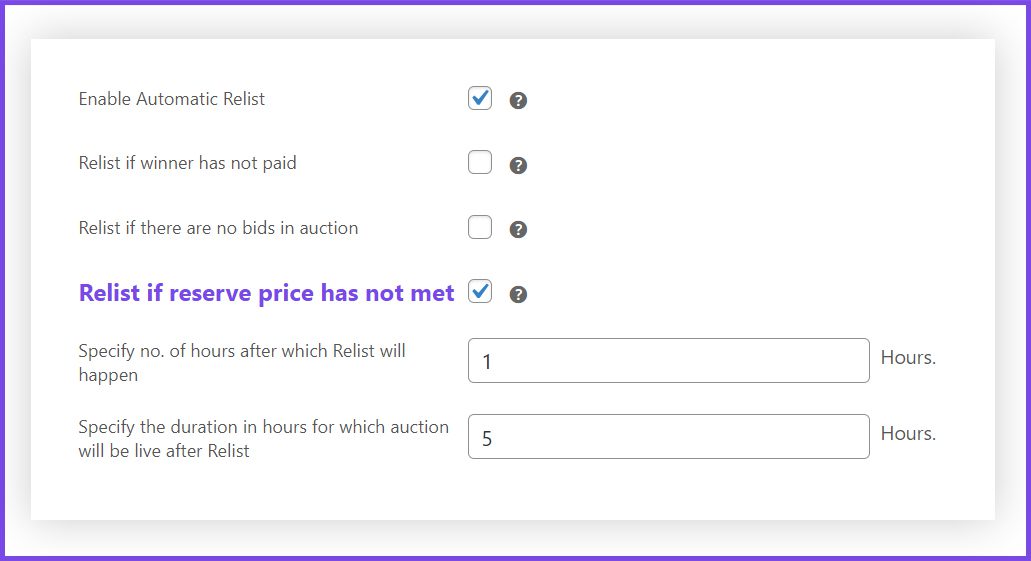
It means that when the auction has ended and the reserve price is not matched, the auction will be automatically relisted 1 hour after the end.
Private Sale: If the highest bid comes close to meeting the reserve, the seller may decide to contact the bidder privately and negotiate a private sale outside of the auction. This can be done if the seller believes they can reach an agreement with the bidder on the price.
Finally, what does no reserve auction mean? In an auction, no-reserve means that there is no minimum price or reserve price set for the item being auctioned.
No Minimum Price: Unlike auctions with reserves, where the seller sets a minimum price that must be met for the item to be sold, a no-reserve auction has no such minimum. Bidding can start at the opening price, and the highest bid at the end of the auction wins the item.
Certainty of Sale: With no reserve price, there is a guarantee that the item will be sold to the highest bidder. This can attract more bidders and create a sense of excitement since everyone knows that the highest bid will win the auction.
Potential for Bargains: For buyers, no-reserve auctions can present opportunities to potentially get items at a lower price, especially if there is limited competition and bidding remains relatively low.
Risks for Sellers: On the other hand, for sellers, it can be riskier because there’s a possibility that the final bid might not reach the desired price for the item. However, it can also lead to competitive bidding and potentially higher final sale prices if there are multiple interested buyers.
It is often used to generate more interest and activity, as they remove the uncertainty associated with meeting a minimum price. They can be particularly popular for certain types of items where the market demand is high or for sellers who are more interested in quickly selling the item rather than achieving a specific price point.
Admin can create this auction using the WordPress auction plugin by following the below steps.
